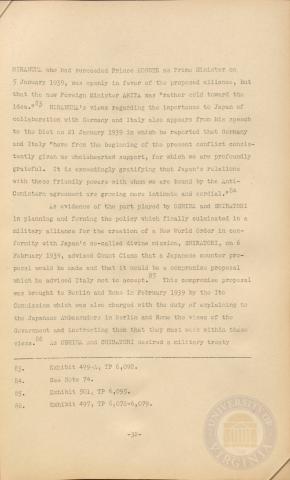
Page 32
| Parent | Japanese - German - Italian Collaboration |
|---|---|
| Date | |
| Language | English |
| Collection | Tavenner Papers & IMTFE Official Records |
| Box | Box 14 |
| Folder | Japan, Germany, Italy Collaboration and Introduction |
| Repository | University of Virginia Law Library |
HIRANUITA who had succeeded Prince KONOYE as Prime Minister on 5 January 19399 was openly in favor of the proposed alliance, hut that the new Foreign Minister ARITA was "rather cold toward the idea.'-'^ HIRANUHA's views regarding the importance to Japan of collaboration with Germany and Italy also appears from his speech to the Diet on 21 January 1939 in which-he reported that Germany and Italy "have from the beginning of the present conflict consis¬tently given us wholehearted support, for which we are profoundly grateful. It is exceedingly gratifying that Japan's relations with these friendly powers with whom we are bound by the Anti- Comintern agreement are growing more intimate and cordial."
As evidence of the part played by 0SHIMA and SHIRATORI in planning and forming the policy which finally culminated in a military alliance for the creation of a New World Order in con¬formity with Japan's so-called divine mission, SHIRATORI, on 6 February 1939, advised Count Ciano that a Japanese counter pro¬posal would be made and that it would be a compromise proposal
which he advised Italy not to accept.85 This compromise proposal
was brought to Berlin and Rome in February 1939 by the Ito
Commission which was also charged v/ith the duty of explaining to
the Japanese Ambassadors in Berlin and Rome the views of the
Government and instructing them that they must work within these
views.86 As O'SHIi-IA and SHIRaTORI desired a military treaty
83Exhibit 499-A, TP 6,092.
84See Note 74.
85Exhibit 501, TP 6,095.
86Exhibit 497, TP 6,072-6,079.
